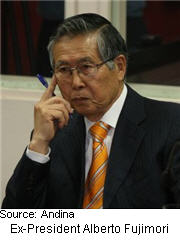At the opening of his fourth trial on Monday, Peru’s former President Alberto Fujimori accepted the charges of telephone espionage, bribery of congress members, and illegal “buying” of news media carried out during his 1990-2000 administration.
By accepting the charges, Fujimori has guaranteed that the trial will be brief –a verdict is to be handed down this Wednesday, only two days after the first hearing instead of maybe a year from now. More importantly, he effectively avoids a parade of more than 60 witnesses that would testify to the charges.
The witnesses include leading journalists, politicians and former military officers, as well as key figures such as his intelligence chief, Vladimiro Montesinos, his ex-wife Susana Higushi, novelist and 1990 presidential candidate Mario Vargas Llosa, and former UN Secretary General and 1995 presidential candidate Javier Pérez de Cuellar.
Congressman Carlos Raffo, a spokesman for Fujimori who travelled with the President when he fled to Japan in 2000, said after the hearing that Fujimori had accepted the charges to “avoid a reality show” and because “he has no hope of justice in a court that has turned into a political firing squad.”
Former congressman Javier Diez-Canseco disagreed, and believes Fujimori’s decision was a clever maneuver to avoid the public re-telling of 10 years of events that led to the criminal charges. “The Fujimoristas do not want the truth to be discovered and are also trying to protect the future candidacy of the ex-President’s daughter, Keiko Fujimori, in 2011,” he shouted to the press at the proceedings.
Before the trial opened, former state attorney José Ugaz said this fourth trial had special connotations because of the crimes included in the charges. “It will have an important value for the justice system and public opinion” to know exactly “how this corrupt machinery worked during the two Fujimori governments led by the ex-President and his partner and advisor Montesinos,” Ugaz said.
The district attorney in the Special Criminal Court, José Peláez, is asking for an eight-year jail sentence, plus fines of $1.6 million to be awarded to the State and a total of $1 mn to plaintiffs. Besides the State witnesses, the case also includes several plaintiffs, among them journalists, politicians and former military officers.
Alberto Fujimori’s first trial began in December 2007, shortly after he was extradited from Chile on seven criminal charges. Since then, he has received sentences of six years for breaking and entering the home of Vladimiro Montesinos’ wife, Trinidad Becerra, and stealing suitcases presumably full of video tapes; and seven and a half years for embezzlement and giving $15 million compensation from public funds to Vladimiro Montesinos.
The signature trial, a first in which a former head of state has been extradited back to his country to be tried for human rights violations, was for the murders at Barrios Altos and La Cantuta university, committed in 1991 and 1992. Fujimori was sentenced to 25 years imprisonment.
Under Peruvian law, sentences are not accumulative, and Fujimori will serve the longest term he has been given. However, Fujimori has now appealed the 25-year sentence, which is currently being reviewed by the Supreme Court. 





